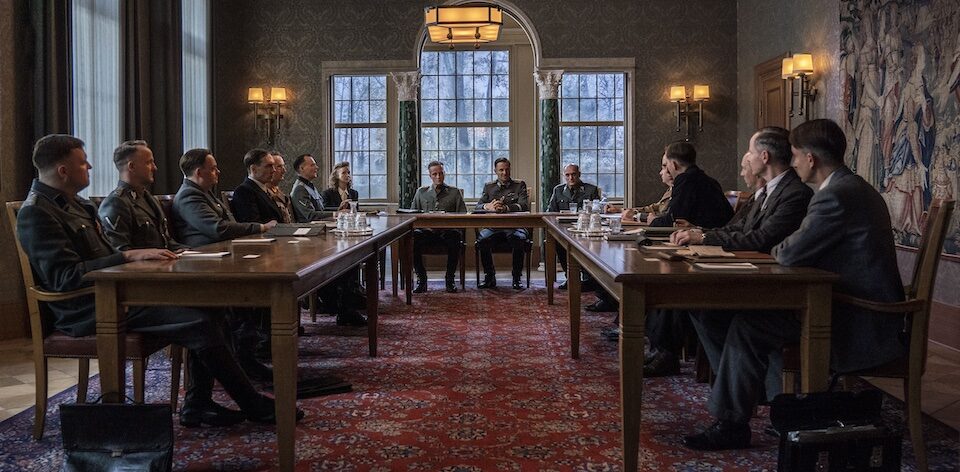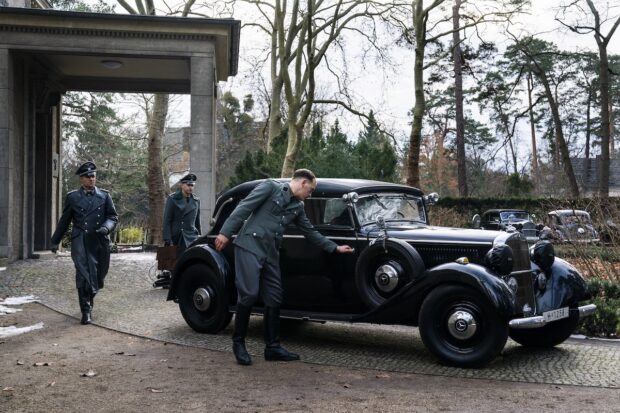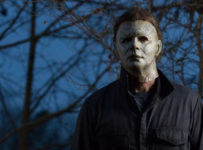The short and terrible period of Nazi Germany has been well covered by cinema in the 77 years since the end of the war. Rightly so: the old adage about remembering history lest we be condemned to repeat it has never been so salient. Many of these have been told from the perspective of the US or UK, but THE CONFERENCE (Die Wannseekonferenz) follows in the tradition of the highly parodied Downfall (2004) in being a film in which Germany critically examines its own history.
The conference of the title refers to the 1942 Wannsee Conference, a meeting of a meeting of senior government officials of Nazi Germany and Schutzstaffel (SS) leaders in the Berlin suburb of the same name. The topic of the meeting was to determine the “Final Solution to the Jewish question,” setting in motion the machinations that culminated in the Holocaust of some six million Jewish people across Europe by the end of the war in 1945.
One of the principal figures in this cold-blooded conference, at least as depicted in director Matti Geschonneck’s film, was Reinhard Heydrich, Chief of the Reich Security Main Office (Philipp Hochmair). Together with Adolf Eichmann (Johannes Allmayer) and Wilhelm Stuckart (Godehard Giese), they discuss the practicalities of their plans.
Geschonneck has presented the film as a docudrama, so there is a certain element of clinical coldness to the proceedings. Which seems to be the modus operandi of this production: presenting the facts as they happened, in the words of the people who committed the atrocities, while they break for drinks and coffee. The mostly silent Ingeburg Werleman (Lilli Fichtner), a very real secretary and photographer, sits in the corner as a reminder that there were witnesses to this history. (Werleman’s testimony was later used in war crimes trials).
The cast tread a thin line in their infamous roles, knowing that they can’t make these characters sympathetic. Yet they don’t just go through the motions either, adopting the film’s broader philosophy of letting the audience and history judge these monsters as harshly as we damn well want to.
In the final moments, when the pieces fall into place for their horrifying plans, we ultimately see why Geschonneck and screenwriter Magnus Vattrodt have taken this approach. As they issue memos over self-congratulations and cognac, one official comments that “No one will say that they didn’t know anything.” Geschonneck’s view of Germany’s own history is one of collective culpability, and a reminder that life and liberties can be taken away by a group of men in a room in a single day.
2022 | Germany | DIRECTOR: Matti Geschonneck | WRITERS: Magnus Vattrodt | CAST: Philipp Hochmair, Johannes Allmayer, Maximilian Brückner | DISTRIBUTOR: Pivot Pictures | RUNNING TIME: 108 minutes | RELEASE DATE: 11 August (AUS)
If you would like to hear the stories of survivors and memoralise those murdered during the war, please visit the Sydney Jewish Museum, the Melbourne Holocaust Museum or one of the memorials in your city.






